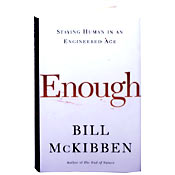
Enough: Staying Human in an Engineered Age is Bill McKibben’s third book about doing without, following Maybe One, about having only one child, and Hundred Dollar Holiday, about the virtues of the simplest possible Christmas (it was, appropriately, the slimmest possible volume).
The job McKibben sets himself here, however, may be even harder than persuading Americans to put their credit cards away. McKibben, the author of The End of Nature and as good-natured an enemy of the modern American way of life as one can possibly imagine, aims to put the brakes on the revolutions in biological and computer science. He worries about what’s called germline manipulation, currently prohibited for humans, by which qualities like IQ, say, or blonde hair, or morality, could be engineered into a child’s genes. Another cause for hand-wringing is nanotechnology, the new techniques of manipulating materials at the atomic level that some scientists believe might ultimately lead to Star Trek–like manufacturing marvels, and finally (cue ominous orchestral track) to “Homo Cyberneticus,” a creature, according to one British futurist, with “a full duplex link between man and machine.”
McKibben doesn’t want to meet him. “We stand on the edge of disappearing even as individuals,” he writes. “We are snipping the very last weight holding us to the ground, and when it’s gone, we will float silently away into the vacuum of meaninglessness.”
Forest ruminant that he is, McKibben perceives this technological commotion at a distance and rather dimly. Proselytizers and techno-radicals flit across the pages talking about a world without work, about immortality, about downloading consciousness into computers, about the limited computing power that finally may lead to a Terminator-style war between man and robot.
These may eventually be significant questions, possibly posing a peril even greater than global warming. At this point, however, it’s extremely difficult to tell the dire inevitabilities from the hot air. McKibben is taking issue with the kinds of ideas that came up in Palo Alto over a good bottle of Napa Chardonnay, when everybody thought they had the simple matter of getting rich on the Internet licked. To invoke another ruminant: McKibben is shutting the barn door before the cows have even arrived. McKibben would make an excellent neighbor, a man who would always stop to push your car—even a gas-guzzling SUV—out of a snowbank. And saving the planet begins at home. But there is narcissism here, too—saintliness as obsessive moral hygiene. Moral hygiene, no doubt, is a useful quality, but saintliness is not always an arguer’s best posture.
McKibben is a genius of self-abnegation with his ceaseless marathon training. One pines for the granola-head exuberance of the Whole Earth Catalogue, a scoop of Cherry Garcia with the dutiful gruel. For McKibben, less is always more, and everything in his work proceeds from a sense of satisfaction with the life he’s carved for himself in the Adirondacks. But McKibben’s isn’t a good life for everyone—for one thing, the Adirondacks might get rather crowded.
“To put it bluntly,” he writes, “the fight to ward off a posthuman future begins with at least a muted celebration of the human present.” We know how McKibben feels about muted celebrations. Still, as an affirmation, this feels somewhat impoverished. McKibben goes on to cite the Amish (the Amish!) as an example of a people who’ve managed to renounce progress. They have admirable virtues, to be sure. But they probably don’t have much to show the world about managing the onrush of technological change. He also cites the Chinese renunciation of sea-faring in the early 1400s—just as China was on the verge of discovering America—as a possible model for how to stop our scientific explorations. “We’re less interested here,” he writes, “in whether it was a good idea than in the mere fact that it happened.” McKibben’s tin ear for politics will have to be completely reengineered if he intends to start a movement.
Books & the Mix Listings
• Readings
• Lectures
• More in Books and the Mix
Enough: Staying Human in an Engineered Age
By Bill McKibben
Times Books; 251 pages; $25.